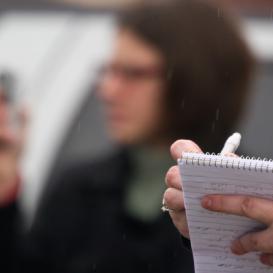The author Edward Bulwer-Lytton wrote that the pen is mightier than the sword. The pen, whether through ink or through the keys on a computer keyboard, mobile phone or other device, produces the written word, words that evoke emotion, conversations, ideas and debates.
Words are used for just about everything – from vigorous disdain or praise toward David Cameron’s policies and light-hearted banter about Tottenham Hotspur, to whether one of those One Direction fans decides on Twitter to copy lyrics to their song ‘Steal My Girl’ as their latest post, as an avatar of Harry Styles stares back at you, in the hope of recognition from the group that particular user idolises (or the hope of a retweet from Nick Grimshaw).
Words are ubiquitous in everyday life – we wouldn’t be a functioning society if we didn’t have them, and they are ubiquitous particularly in journalism. Every day, men and women around the world take to their screens or notepads to compose the words that will describe the scene of the story they produce, whether it’s the latest development from Downing Street, whether your favourite artist is releasing a new record, or whether your campus decided to open up a Starbucks front and centre for all to see.
These words will form the basis of a script for TV or radio, or for the article that will appear online and in newspapers. The people who write these words do not seek fame nor fortune. Instead, they do it as a public service, for the belief that what they are doing is for the common good, in the hope that the public they serve, be it in small communities or large centres of the population, be better for it.
Changing direction
However, the profession of journalism can be a risky one – according to the Committee to Protect Journalists, a global journalism advocacy organisation based in the United States, in 2015 alone 69 journalists were killed while trying to make sense of the world with words, words designed not to harm, but to educate and inform.
Indeed, student media has been the subject of much talk of censorship, most notably The Badger at the University of Sussex this past September. Whether you write for the Badger, or any student publication up and down the UK, broadcast on RAW1251 at Warwick, or do film review segments for Quays News in Salford, you are making the journalism industry better – one article and segment at a time.
My spoiler free review of STAR WARS: THE FORCE AWAKENS has arrived on my blog https://t.co/nhr2iPzgst #StarWars #TheForceAwakens
— Emily Murray (@EmilyVMurray) December 22, 2015
Amy Brandis, a Warwick student on a year abroad in Paris, comments on last nights events https://t.co/hQ8Mcci039
— RaW News (@RaWNewsWarwick) November 14, 2015
The media climate is changing. Next year, Twitter will celebrate its tenth birthday while the political debate over the future of the BBC, the world’s foremost public broadcaster, continues ahead of its charter renewal in 2017, and whether those in power will attempt to silence it, depriving the public, at home and abroad, of the ability to be educated and informed about the world around them.
For newspapers, advertising revenue will continue to be a subject of concern, as News UK considers its future, with The Sun setting on the concept of its paywall, and the Times not changing its tone on it whatsoever. All of this as The Daily Mail, The Guardian, BuzzFeed and other sites continue to compete for those hits.
Journalism needs you
The mediums are changing, but one thing is clear – the world needs words, and some of the best come from journalism, for if the pen is mightier than the sword, knowledge is mightier than silence, and that comment remains free and facts remain sacred.
It is for these reasons that we do what we do, no matter what we cover, no matter where this profession takes us, no matter what words we use – the world needs journalism, and journalism, dear reader, needs intelligent people like yourself to bring it forward.
So no matter if you’re studying at university at the undergraduate or postgraduate level, taking an NCTJ course with the Press Association, or trying to build your portfolio and work through practical means, you are contributing to the principle at the core of journalism’s contributions to democracy.
When you walk into Broadcasting House in central London, in front of you is the BBC’s coat of arms, with this simple principle, dating back to its founding: “Nation shall speak peace unto nation.” If you want to know why I, or many others do journalism, it is not to harm, but to ensure peace. After all, an informed public can be a peaceful public.
Happy New Year.
What do you think? Have your say in the comments section below. To submit a question for Mastering Media, click here or send an email to Acting Media editor Alex Veeneman.









